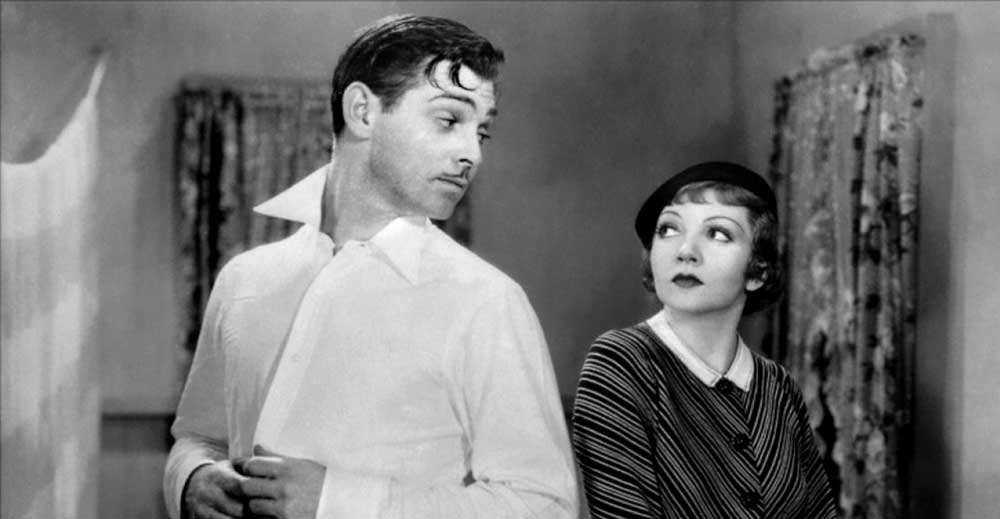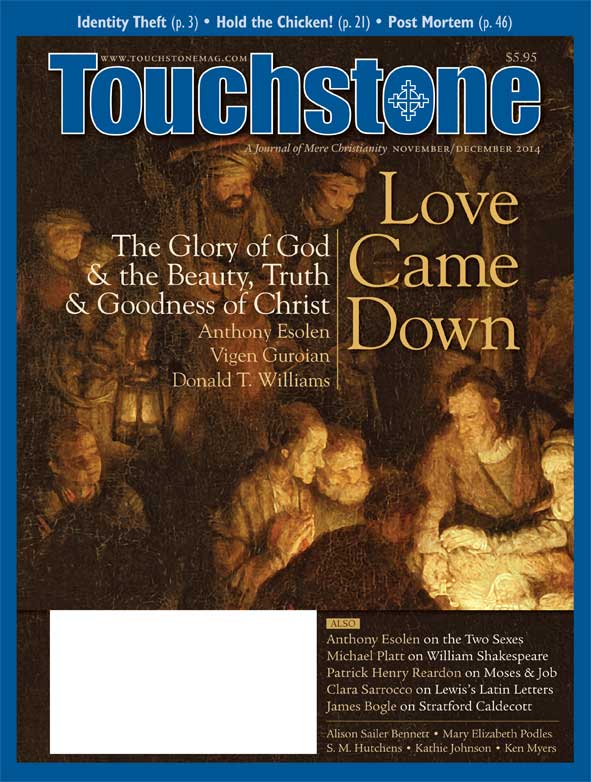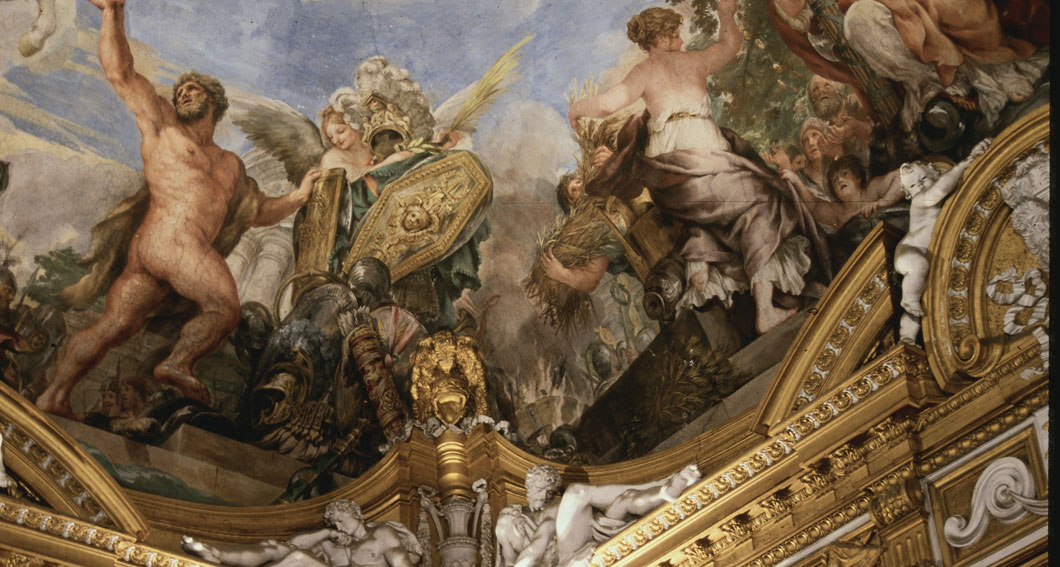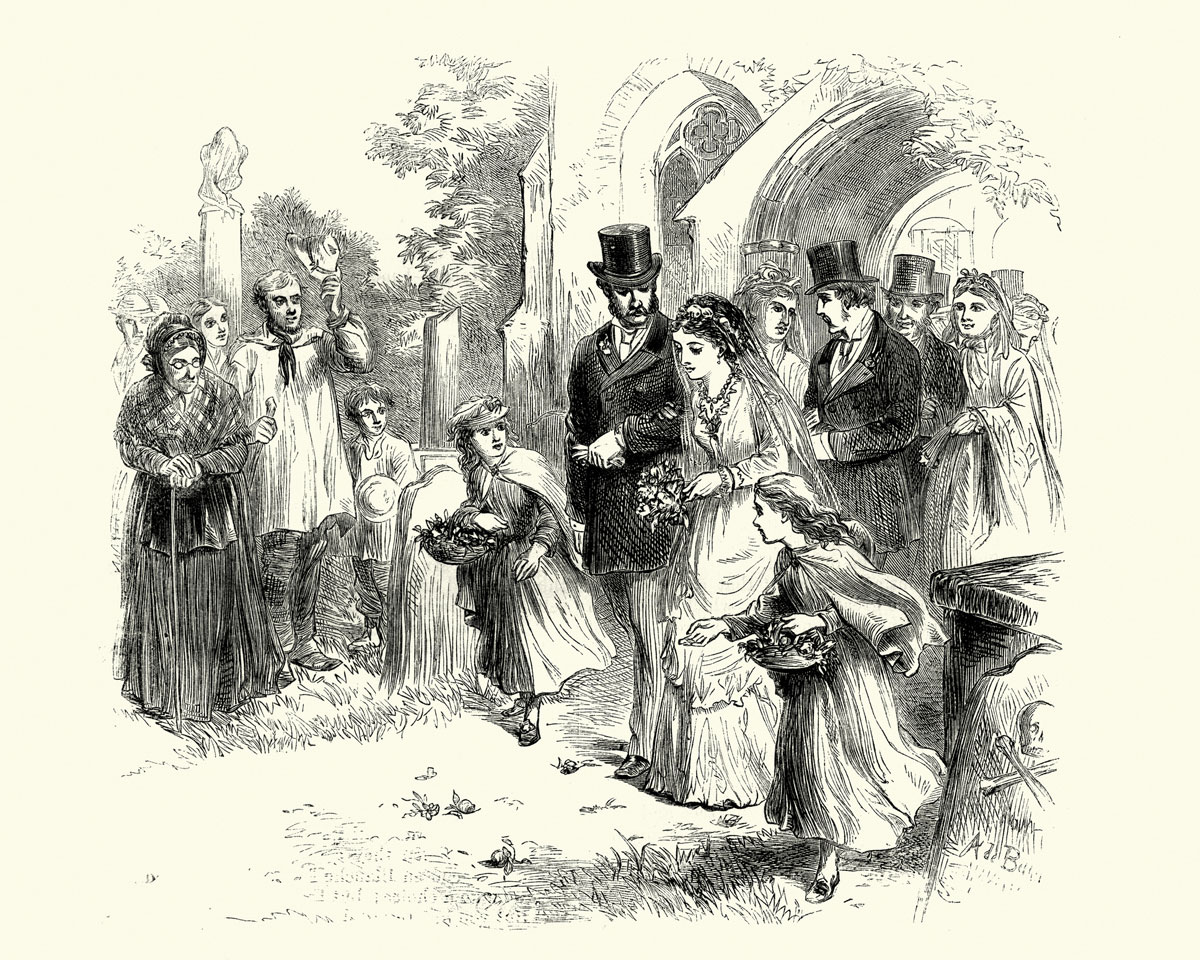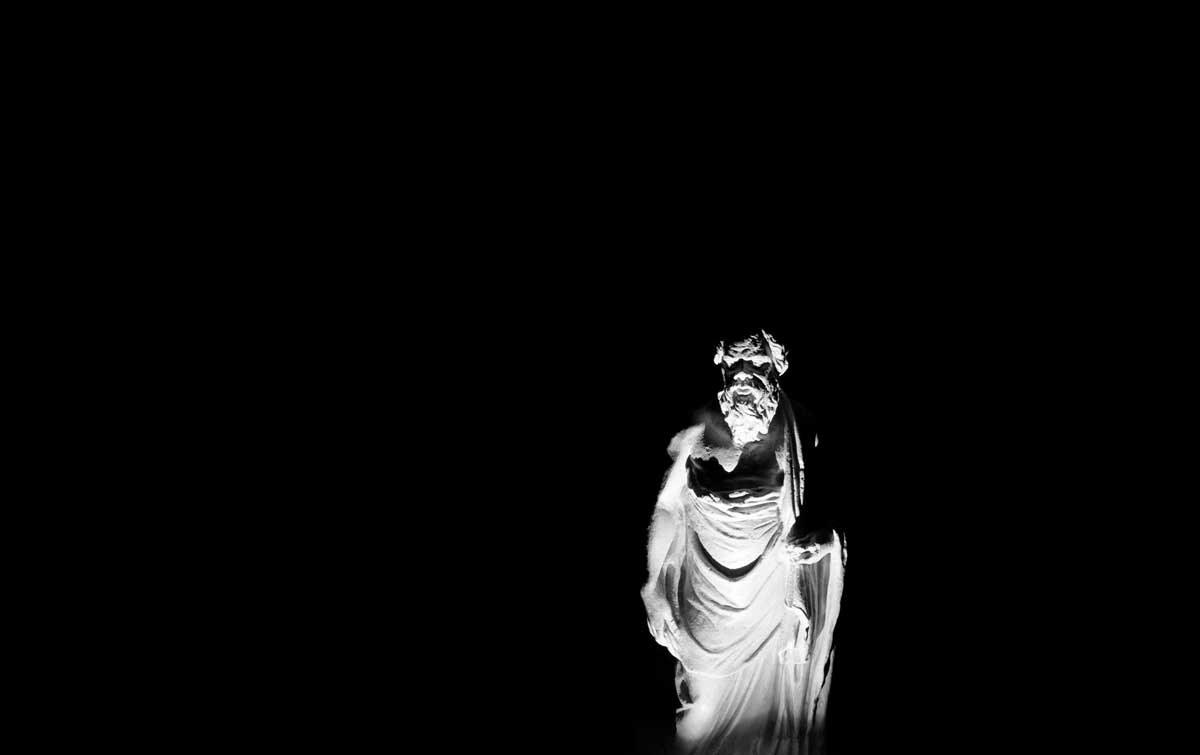Feature
Tales of Forbidden Stereotypes
Real-Life Men & Women & the Tragic Loss of Human Comedy
Among the many nerve-scraping scenes in the movie The Lord of the Rings, there's one that especially makes clear to me why much of our art will be consigned to a deserved oblivion.
Aragorn, destined to return as the king of Gondor, is in ponderous conversation with Arwen, the Elvish woman who renounces immortality to become his wife. The lighting is dim, and the colors behind them are forty shades of somber. Arwen has just played the sweaty warrior princess to save Aragorn and his friends from a surprise attack—though Tolkien wrote no such thing. Now Aragorn is wondering whether he has it in him to be king, so he expresses his ponderous doubts to this sharp-boned razor of strength—though Tolkien assigns to Aragorn no such doubts. Aragorn's alias was Strider, not Ditherer. Arwen talks to him half-man to half-man, after which they kiss long and dispassionately, with all the electricity of a piece of plastic coming in contact with a piece of plastic.
Or there's the scene in Titanic (1997), in which pretty boy Leonardo DiCaprio, supposedly playing a kid who has just been sleeping under bridges, is trying to persuade rich pretty girl Kate Winslet to let him pull her up over the edge of the ship, mid-suicide. "You don't want to do this," he says, as if he were a volunteer on the telephone at the Good Samaritans, and not somebody with strong arms who could restrain her on the instant and holler for help. Later she will ask him to teach her how to spit like a man. The culmination of modern feminism: a semi-girl asking a semi-boy how to behave like a caricature. She's going to marry a rich man, hiss hiss, whom she doesn't love. What's the solution? One two three four, show the villain out the door, five six seven eight, find a punk and fornicate.
A Real Man & Woman
Take by contrast—anything, really, but let's go to It Happened One Night. A brash but lonely newspaper reporter has stumbled upon the socialite story of the year. She's the daughter of a self-made millionaire, on the run from her sheltered life and her father, who does not want her to marry the rich narcissist who has been courting her. She wants to return incognito to New York, and the reporter is helping her in exchange for the exclusive story, though it soon becomes clear that they are falling in love with one another, and that he really is the man she ought to marry.
The problem for their secret trip north is simple enough. They don't have any wheels, they don't have any food, and they don't have any money. So, after a rough night which they spend sleeping—separately—under some hay in a field, and after a breakfast of a couple of limp carrots he's dug up, he is trying to demonstrate to her his three sure-fire methods for hitching a ride. He's been her protector, after all, and boys like to show off in front of girls. But this time his sure-fire methods fail comically, one after another, as cars go whizzing by, until he is finally reduced to a vulgar gesture of frustration.
She's sitting on a fence, enjoying the scene. "Let me try," she says. "I bet I can get us a ride right away."
"You?" he says. "What do you know about it?"
She replies that she knows a trick of her own. So she stations herself at the side of the road, and when the next car comes she leans over and pulls up her skirt along one slender and stylish leg. The car screeches to a halt. The reporter looks on with wide eyes—and it isn't just that he is surprised that the strategy worked.
Clark Gable and Claudette Colbert are electric in their roles, and not because Gable had classic good looks (he didn't), or because Colbert was some sultry southern bathing beauty with parted lips and sand in her hair (she wasn't). They were electric because he was a man and she was a woman.
That they are man and woman, not Human Thing One and Human Thing Two, lends force to the moral structure of their discovery of one another. Marriage, not a toss in the blankets, is the central reality of the film, as the heroine turns from marrying a rich fool to marrying a real man who has to work for his food. But marriage can hardly be so momentous an event if there is nothing to marry; no separate ways of being human, no sexes, to bridge their chasm of misunderstandings and form a union unique in human existence and greater than the sum of the persons involved. All of which explains why chastity, implying a due honor for man as man and woman as woman, is also held inviolable. It, too, provides for plenty of electricity.
When the reporter and the socialite have to share a room in a low-class motel, he strings a line between their beds and drapes a sheet over it, calling it "The Walls of Jericho." Those walls are a recurring motif, comical in the medieval Christian sense. People who begin in error or sin (she's a difficult daughter, he's been drinking too much) are brought to happiness. In the final scene, we don't even see Gable and Colbert. They have been waiting for the official annulment of her license of marriage with the rich snob, whom she jilted at the altar. Finally that has come in. So we are at another roadside flophouse, and the mom and pop owners are whispering about the couple who have just rented a room.
"What did he say he wanted?"
"A bugle!"
"What did he want a bugle for?"
"I don't know—something about the Walls of Jericho."
And the last thing we hear is a cavalry charge played on that bugle, as the sheet falls to the floor.
Reality & Types
At this point I hear that most tiresome objection, that I am indulging in stereotypes. Children are taught for twelve years that there is nothing so stupid as falling for a stereotype; by which is meant that of all the realities in this world, the only things that have no characteristic features are men and women. No teacher or critic will object if the dog wags his stereotypical tail when the master comes home. No feminist will object if the well-fed Anglican prelate, Mr. Collins in Pride and Prejudice, flaps his stereotypical lips about the taste and the excellence of his eminent patroness. No maven of Correct Thinking will object if the kindly old man in Two Farthings for a Kid tells a stereotypical tall tale about unicorns to the little boy Joe, who stereotypically believes it and goes in search of that fabulous creature who will make everything better in the lives of the people he stereotypically loves. No, the only creatures we must pretend to know nothing about are men and women. Alas, since men and women—especially in their relations to one another—populate almost all of the stories of mankind, that means we will have nothing interesting to say.
The excuse for this aversion to types is that they take the place of real thought. They are reductive. But that is to mistake the manner for the form. There is metered poetry that jigs along like a beggar with fleas, or that ticks its dreary length like a metronome; but that is because it is bad verse. A painter may deck his landscape with one great patch of Kelly green, and we may find it wearisome to behold, but that is not because grass is not green; it is because he is a bad painter of green. You would never sing in honor of your homeland the grim march that John Williams composed for the evil Empire in Star Wars; but that is not because anthems should not sound like anthems. You would not sing it, because it is (and was meant to be) an evil anthem.
What is really remarkable, though, is that for two and a half millennia, poets, philosophers, and critics have affirmed that the greatest works of art deal in types. Here is a characteristic passage from Samuel Johnson:
Shakespeare is above all writers, at least above all modern writers, the poet of nature; the poet that holds up to his readers a faithful mirrour of manners and of life. His characters are not modified by the customs of particular places, unpractised by the rest of the world; by the peculiarities of studies or professions, which can operate but upon small numbers; or by the accidents of transient fashions or temporary opinions: they are the genuine progeny of common humanity, such as the world will always supply, and observation will always find. His persons act and speak by the influence of those general passions and principles by which all minds are agitated, and the whole system of life is continued in motion. In the writings of other poets a character is too often an individual; in those of Shakespeare it is commonly a species.
Johnson does not mean that every man in Shakespeare is like every other man. He means that Shakespeare penetrates to the essential features of mankind, understandable by all people, wherever and whenever they live. We know the sprightly Rosalind. We have met the pure and tart-tongued Imogen. We have seen the manly diamond in the rough, Orlando. We have had converse with the wise and sometimes too wise Friar Lawrence, with the generous hothead Capulet, with the prim boy Paris; with Romeo, whose stirrings of nobility alternate with youthful heedlessness; with Juliet becoming a woman before her time.
The Power of Boldly Drawn Difference
Johnson's contemporary, Henry Fielding, taking a cue from Horace's Ars Poetica, gives us through the learned and poetry-loving Parson Adams a similar encomium on the genius of Homer. Here the emphasis is on the individual as representing a type that is recognizable once the artist shows it to us:
How accurately is the sedate, injured resentment of Achilles, distinguished from the hot, insulting passion of Agamemnon! How widely doth the brutal courage of Ajax differ from the amiable bravery of Diomedes; and the wisdom of Nestor, which is the result of long reflection and experience, from the cunning of Ulysses, the effect of art and subtlety only! . . . Indeed, I might affirm that there is scarce a character in human nature untouched in some part or other.
But to be a brilliant portrayer of the characters of mankind is to portray also their strongest feelings:
And, as there is no passion which he is not able to describe, so is there none in his reader which he cannot raise. If he hath any superior excellence to the rest, I have been inclined to fancy it is in the pathetic. I am sure I never read with dry eyes the two episodes where Andromache is introduced in the former lamenting the danger, and in the latter the death, of Hector. The images are so extremely tender in these, that I am convinced the poet had the worthiest and best heart imaginable.
We are expected to recall that fine moment in the Iliad when the brave Hector, as much husband and man of peace as he is a warrior, meets his wife Andromache, who begs him to let the other men for one day take the brunt of the battle. She is holding their baby boy, whom the Trojans have given the nickname Astyanax—Lord of the City. It's a tragic name, since that boy will be hurled to his death from the ramparts when the Greeks finally burn the city to the ground. She gives him the child to hold, but the baby sees his father's flashing helmet and its waving plume, and they frighten him. He cries, the mother and father smile, Hector removes his helmet—which any good man would do, though the gesture is telling—and dandles the boy in his arms, saying that he hopes the Trojans will say of Astyanax that the father was a good man, but the son far better. It is not to be.
Now, no one in Fielding's day was so mad as to believe that men and women were interchangeable, and indeed the power of the scene between Hector and Andromache depends upon the boldly drawn difference. We have the tall, broad-shouldered Hector, who goes to war for the honor of his family and his country, but who might have been happier had there never been any war at all; gentlemanly Hector, who never reproaches his sister-in-law Helen, the cause of the war; and Andromache, whose name suggests the battle of men, but who has eyes only for her husband and her son; whose hopes are bound up in them, now that she has no other family; who does not wheedle, as Helen does, but whose pleading is open and heartfelt; with whom one can imagine evenings of peace and gentle laughter.
The fact is, we never do meet individuals divested of age, sex, profession, and culture. Such beings do not exist. We meet men, women, and children. We meet youths and lasses, priests and lawyers, rich city dwellers and pig farmers. We realize ourselves as individuals only within and through types, deeply founded in nature, as culture itself is founded in nature: culture is man's nest. To complain that Andromache is "socially constructed" is not simply ridiculous anthropology, since Andromache is immediately recognizable by men and women from all kinds of places and conditions in the world, and will be so as long as men can breathe and eyes can see. It is to commit to a false dilemma. Our cultures themselves spring from our nature, and give that nature room to flourish.
No Alternative
But doesn't this submission to nature tie the artist's hands? Far from it. It is the natural that allows for freedom and flourishing. I can walk on my hands, but not well. I can plant a maple tree in swampy land, and it will grow, but not tall. I can give my daughter an ax and tell her to cut down a great oak, and maybe, one time in a hundred, it will get cut down, but not without blisters and blood and many wasted hours. Throw nature out the door, said Horace, and she will leap in again at the window. You can respect it and flourish, or scorn it and suffer the consequences of your folly. You can pretend all you like that there are no such things as men and women, just as you can pretend to suspend the law of gravity, but if you step over the brink of a cliff, your cartoon fantasy will not save you.
The point of recognizing men and women is not to reduce them to pasteboard caricatures. The point of raising boys to be men and girls to be women is not to reduce them to two brands of robots. It is to honor their nature, and give them, through their nature, the best chance for flourishing, and gloriously myriad ways in which to flourish. To say "There are such things as dogs" is the first step towards recognizing the many fascinating ways in which the canine nature is realized. To pretend that dogs and cats are alike is to indulge in a willed refusal to look closely at either. If you raise a dog like a cat, you will not get a cat or a very interesting dog; you will get a dull failure.
Now, nobody really does that, just as it is impossible for any artist to dissociate himself from types. To believe that there are no classes of things, but only this and that, is just this side of chaos. So even contemporary artists who believe they are bold in rejecting our inherited wisdom—sniffing at the supposed stereotype in Andromache—cannot help turning to types of their own imagining. There is no escape.
The Real Social Construction
So, in a diagnostically awful movie, A Perfect Murder, starring Michael Douglas and man's best case for a neuter gender, Gwyneth Paltrow, she and he are on the floor of an apartment, and he's out to kill her. Miss Paltrow does not have a feminine body. She has cultivated the unnatural, the body of a skinny prepubescent boy with asthma. Somehow this collocation of matchsticks, from a sitting position whence she cannot muster the full force of her ninety pounds, delivers a blow to Douglas's head that sends him reeling across the floor. That gives her a chance to grab a meat thermometer and plunge it into his neck. No, this is not a cartoon.
The director, Andrew Davis, has not turned away from types. He has only rejected Woman (think of Grace Kelly in the original, Alfred Hitchcock's Dial M for Murder) in favor of Strange Stridulodental Female, such as is only to be seen in film. The part writes itself. I am not complaining that Davis has fallen for a type. I am complaining about the type he has fallen for: it is phony, shallow, and stupid.
And since it is counter to nature, it is the thing that is socially constructed, a wholly artificial product of a most particular place and time (contemporary Hollywood), and a particularly odd group of people (male feminists). As such, it must be flat and predictable, just as there's really only one kind of maple tree growing in a swamp (half-dead), and only one kind of walking down the street on your hands (difficult and absurd). So, too, when academics complain about stereotypes and the sexes. They have nothing interesting to say about men and women, and I can write their sentences for them, or finish their shouts as they cry "Diversity!" in unison, ignoring the greatest and most fascinating human diversity, which is ever before their eyes.
Not much fun in that.
Frank Capra knew better, as did Gable and Colbert. The self-made man has finished haggling with his daughter's ex-fiance, and has just gotten word: annulment settled. A secretary comes in with a funny telegram. "Sir, all it says is that the walls are shaking."
"Send a telegram back," barks the father. "Let 'em fall!"
Anthony Esolen is Distinguished Professor of Humanities at Thales College and the author of over 30 books, including Real Music: A Guide to the Timeless Hymns of the Church (Tan, with a CD), Out of the Ashes: Rebuilding American Culture (Regnery), and The Hundredfold: Songs for the Lord (Ignatius). He has also translated Dante’s Divine Comedy (Random House) and, with his wife Debra, publishes the web magazine Word and Song (anthonyesolen.substack.com). He is a senior editor of Touchstone.
subscription options
Order
Print/Online Subscription

Get six issues (one year) of Touchstone PLUS full online access including pdf downloads for only $39.95. That's only $3.34 per month!
Order
Online Only
Subscription

Get a one-year full-access subscription to the Touchstone online archives for only $19.95. That's only $1.66 per month!
bulk subscriptions
Order Touchstone subscriptions in bulk and save $10 per sub! Each subscription includes 6 issues of Touchstone plus full online access to touchstonemag.com—including archives, videos, and pdf downloads of recent issues for only $29.95 each! Great for churches or study groups.
Transactions will be processed on a secure server.
more on sex from the online archives

28.2—March/April 2015
Man, Woman & the Mystery of Christ
An Evangelical Protestant Perspective by Russell D. Moore
more from the online archives
calling all readers
Please Donate
"There are magazines worth reading but few worth saving . . . Touchstone is just such a magazine."
—Alice von Hildebrand
"Here we do not concede one square millimeter of territory to falsehood, folly, contemporary sentimentality, or fashion. We speak the truth, and let God be our judge. . . . Touchstone is the one committedly Christian conservative journal."
—Anthony Esolen, Touchstone senior editor





